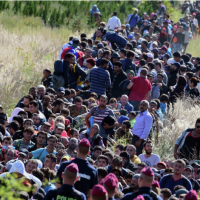
A Virtual Conference on Refugee & Migrant Health, Mobility, Human Rights & Responsibilities
RESISTING BORDERS
Refugees and many migrants suffer from limits on their abilities to move around the world, even in pressing or urgent circumstances.
They are often forced to leave their homes for reasons beyond their control, including war and civil unrest, political and religious persecution, economics, or famine and other natural or man-made disasters.
Once displaced, whether internally or externally, they face pressing needs for food, water, shelter, and health care.
Local governments, international agencies and non-governmental organizations often struggle with providing for their needs, particularly in resource-poor regions of the world.
Recent socio-political changes in the United States, Western Europe and elsewhere have placed additional restrictions on the rights of migrants and refugees.
To explore these and overlapping issues, in solidarity with these refugees and migrants, on October 9-11, 2017, we will be hosting a no-travel virtual conference to explore the ethical, legal, philosophical, and social issues associated with refugee and migrant health in a world of economic, geopolitical, and psychological borders.
CALL FOR PAPERS
In light of the current refugee and migrant crisis, and in response to the political backlash that threatens to exacerbate this unprecedented humanitarian crisis, we will be hosting a no-travel virtual conference to explore the following questions:
- What kinds of restrictions on movement and travel of refugees are ethically permissible and which are not?
- Greater acceptance and humanitarian support is presented as being in tension with greater concerns for security, but how does this tension play out empirically and philosophically?
- What are the implications of ethically justified and unjustified restrictions?
- What is the proper moral response of and toward states that opt to provide acceptance and support versus those that opt for restrictions on refugees and migrants?
- What are the obligations of local governments and organizations to provide care for refugees and migrants with health needs?
- What responsibilities are owed to refugees with health needs who are denied exit or entry?
- What are the obligations of ordinary citizens towards refugees and migrants, and how do state policies affect these obligations?
- What is the moral experience of those facing restrictions based on their nationality or status?
- What is the moral experience of those carrying out state policies?
- What effects do xenophobic policies and practice have on health and wellbeing of migrants and pro-migrant citizens?
We are especially interested in contributions from scholars and practitioners working in the areas of refugee health and/or international humanitarian law, immigration and security, health law and policy. Submissions from those who come from or work in regions facing travel restrictions are especially encouraged.
Interested participants should submit an abstract of 250 words no later than Saturday, April 15th, 2017. Abstracts should be submitted via email to the Organizing Chairs at info@resistingborders.com.
Conference Chairs:
Lisa Eckenwiler, Ph.D., George Mason University (USA)
Samia Hurst-Manjo. M.D., Université de Genève (Suisse)
Sean Philpott-Jones, Ph.D., M.S.Bioethics, Clarkson University (USA)
Organizing Committee:
Ayesha Ahmad, Ph.D., University College London (UK)
Ryoa Chung, Ph.D., Université de Montréal (Canada)
Matthew Hunt, Ph.D., P.T., McGill University (Canada)
Christine Straehle, Ph.D., University of Ottawa (Canada)
Daniel Weinstock, Ph.D., McGill University (Canada)
Verina Wild, M.D., Ph.D., Ludwig-Maximilians-Universität München (Deutschland)



